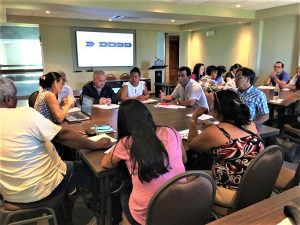Risky Business: Assessing Risk in Ucayali’s Forestry Sector

Recently, I went to Pucallpa, Peru, a place where highway Route 5N ends and the Amazonian jungle takes over. Over a million people live in Pucallpa, which is situated in the heart of Peru’s tropical forest region of Ucayali. Peru’s forested regions have recently made international headlines for breaking scandals around deforestation and illegal harvesting of wood.
In response, Global NGOs and government organizations surged into Peru, armed with various programs designed to help address these problems. However, an unintended consequence of this surge in international interest has been a rise in local cynicism toward NGOs. People living in the forested regions have grown cooler to international organizations, some of which seemingly “parachute in from abroad” and tell locals how best to manage their businesses and forests without sufficiently engaging communities about their thoughts and current business practices.
As part of our “Integrated Compliance” approach to tackling illegal practices in the Peruvian forestry sector, CIPE began a pilot program in Ucayali, Peru in 2018. Integrated Compliance takes a holistic view of anti-corruption and compliance issues by incorporating labor and environmental standards into compliance programs for small and medium-sized enterprises (SMEs). Integrated Compliance helps SMEs create ethical, transparent, sustainable compliance programs, thus improving their chances of connecting to global supply chains.
CIPE collected feedback from the forestry sector by conducting scoping trips, facilitating surveys, and holding focus groups with stakeholders in the region. Through our efforts, we learned that the primary goal of Peruvian forestry businesses is to export more of their products to North America and Europe. Key obstacles for businesses looking to achieve this goal include overall export-market doubts about corruption, forced labor, money laundering, and the legality of the harvested wood. CIPE designed its program in the region around this goal and its obstacles.
Forestry firms in Ucayali region vary in size and thus, many are not ready to sustain a full-bodied compliance program. Furthermore, CIPE found that many firms did not have the tools to assess the key risks they face when trying to export their products to North America and Europe.
On June 18 in Pucallpa, CIPE hosted a workshop for Peruvian forestry firms, teaching them how to identify and weigh their key risks. While the Peruvian soccer team played Bolivia in the Copa America, twenty-six participants from across the forestry sector spent five hours in groups identifying and debating the internal and external risks they face as individual businesses and as a sector. When an outspoken and formerly skeptical participant thanked me for inviting him to the event, I knew that we had achieved a remarkable level of engagement and candor.
Participants discussed the entire value chain, from harvest to export. They agreed that many of the risks they face are external to their businesses and out of their immediate control. By the end of the session, participants were beginning to express an interest using some form of collective action to help them exert control to reduce these external risks.
Building on this workshop, CIPE will hold another workshop for forestry sector SMEs on July 11. This time we will all discuss ways to mitigate the risks outlined in the first workshop. While we will go over standard internal controls and basic compliance that they can use to mitigate the internal risks, we will also delve into collective action techniques that can be used to mitigate the external risks. I’m eager to hear the contours of this debate to come and to see where this road leads.
Jeanne Cook, Program Office, CIPE’s Anti-Corruption and Governance Center
